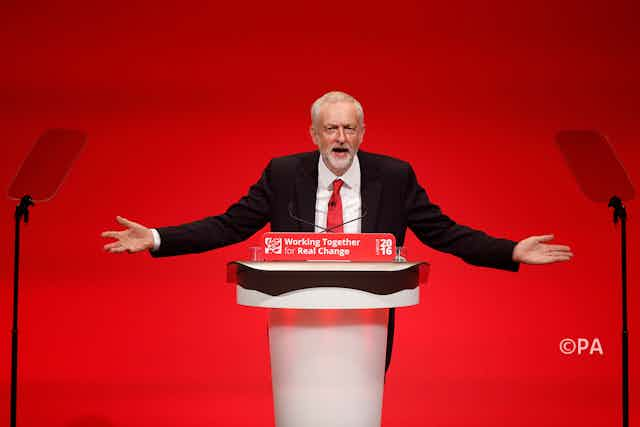Are we close to reaching peak Corbyn? On the one hand, he has a crushing personal mandate after his emphatic win in the Labour leadership election. That gives him the clear authority to move forward and transform Labour into the campaigning social movement he wants it to be. On the other, a number of bitterly contested procedural fixes by the party machine – working through the Conference Arrangements Committee – have prevented Corbyn and his allies from using what they hoped would be a clear majority on the National Executive Committee to enact the rule changes that would have allowed him to do so.
At present Corbyn’s transformational legacy is not secure and the power struggle within the party remains unresolved. An early election is still a possibility and Labour is polling extremely badly. It may turn out that the 2016 party conference in Liverpool was a once-in-a-generation chance that was fluffed by Corbyn and the Labour left.
Tough gig
Corbyn’s closing speech to the 2016 Labour conference was always going to be a tough gig. Would he try to bind the party’s wounds in the wake of an incredibly bruising leadership battle? Or would he assert his right to determine the direction of travel? Would he grasp the nettle of key policy dilemmas that bedevil the party in the wake of the Brexit vote? Would he even mention Brexit? And if he did, how would he address the toxic issue of immigration, worries about which seemed to motivate many Brexit voters?
In the event the speech was something of a missed opportunity. Under the rubric of “a fairer Britain in a peaceful world”, Corbyn moved through the gears as he delivered a competent but uninspiring speech.

Coming on stage to a huge and sustained standing ovation, Corbyn made a couple of moderately successful jokes. These included a somewhat wooden number about Virgin Trains. He then appealed for unity, citing the tragic and brutal murder of Jo Cox, before striking a slightly more jarring tone with some triumphalism about recent electoral results.
Elsewhere, we saw a clear condemnation of anti-Semitism, some banker bashing and a commitment to repealing the Trade Union Act – which many see as curbing workers’ rights. He also spoke of Labour’s living wage plan, of bringing the railways back into public ownership, and proffered some broad brush references to Brexit, as well as the Colombian peace process and Saudi Arabia’s military actions in Yemen.
Throughout all of this, Corbyn spoke with a new authority but perhaps at the cost of suppressing some of his natural passion. It was only when he appealed to Labour factions to “end the trench warfare” that he seemed to let his anger at attempts to undermine his leadership get the better of him.
In the end, despite a year of leadership, it was hard to pin down the political offer being made to the British people in Corbyn’s address. Although it was peppered with crowd-pleasing spending pledges, there was very little sense of where the money to pay for them would come from.
This lack of costing – in fact, the absence of an underlying political economy of Corbynism – reflects the sense that Jeremy Corbyn’s exhortations to the Labour Party to prepare for power are essentially hollow.
Zombie politics
Corbyn spoke of 21st century socialism, but across Europe we can see that conventional social democracy has become what I would describe as a form of “zombie politics”. It is conducted by ossified and tired political parties that were fatally wounded by the global financial crisis of 2008 and their own complicity in enabling it.
Labour’s leftward turn may have saved it from this fate and it now boasts the largest membership of any political party in Europe. But the party faces significant homegrown problems that reflect the fractured society in which it operates.
The 2015 election revealed a fragmented polity. A different political party won in each of the UK’s constituent nations. Labour was the biggest party in Wales but lagged behind the Tories in England and the SNP in Scotland. Labour does not currently organise in Northern Ireland (a topic of debate at conference) and politicians in Labour’s sister party the SDLP can see that Corbyn and his key ally John McDonnell are far closer politically to their bitter rivals Sinn Féin than to them.
More recently, the Brexit referendum revealed deep cultural and political divides in the UK between the young and old, the more and less educated, the urban and rural, the cosmopolitan and nativist, the “winners” and “the left behind”. These divides are reflected inside Labour, where 60% of voters supported Remain but were located in only 35% of Labour constituencies – typically in more prosperous enclaves such as Bristol West, Brighton and Hove, Manchester, and in inner London.
Reconciling the interests of these Labour voters with those they need to win back in “left behind” areas such as Stoke on Trent, Rotherham, or Middlesbrough will take some skillful political alchemy.
Although Labour’s current crisis is portrayed as a battle between pro and anti-Corbyn camps, both are also divided against themselves. Owen Smith’s leadership campaign angered many Blairites in its trashing of Labour’s recent record in government, while the row over Clive Lewis’ speech on Britain’s defence revealed a growing rift between those on the left who see scrapping Trident as a non-negotiable touchstone of leftwing purity and those who see it as an obstacle to building wider support for left-wing economic policies.
So as the applause died away, the Red Flag was sung, ordinary delegates packed up and left for home, and Corbyn’s media team doggedly spun their message of unity and purpose, the impression remains of a Labour Party in deep trouble. Perhaps today’s speech was not just a missed opportunity but also the moment we reached peak Corbyn.

